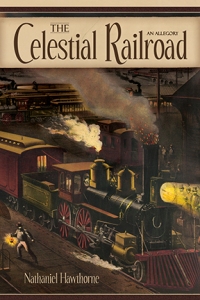I recently picked up my collected works of Nathanial Hawthorn, only to be reminded of how brilliant he was, and how sad it is that top ten lists can only have ten items on them. In particular, I was reading ‘The Celestial Railroad’ which is available from Gutenberg Press.
The story was written in 1843 (according to the date on the website for the story… I didn’t look it up anywhere J ). It is almost shocking how all of the roots of postmodern life are on full display in this story. I would say that the real humanistic modernism was already plunging headlong off the cliff, they just hadn’t hit the pavement yet (that would the World Wars in this brief but hopefully apt analogy.
Anyway, I will copy a few passages here so that you know what I was talking about.
The dreamer sets out in his dream (no dancing around the dreaming trope or the allegory in this story.) on the new railroad that has been built from the City of Destruction to the Celestial City from Pilgrim’s progress. (I have many issues with that book but that is for another time…) However Hawthorn’s story is what Bunyan’s should have been, showing the result of people depending on their own strength to get to heaven. On this railroad ride all the most powerful people from Destruction and their conversation is described such:
There was much pleasant conversation about the news of the day, topics of business, politics, or the lighter matters of amusement; while religion, though indubitably the main thing at heart, was thrown tastefully into the back-ground.
Here the burdens are kept for safekeeping in a baggage car, Apollyon is the chief conductor, and gas from the Valley of Humiliation is piped into a system to be burnt to light the way.
There is, in the place of the Giants at the exit of the Valley, a new resident whose description I thought hilarious:
He is a German by birth, and is called Giant Transcendentalist; but as to his form, his features, his substance, and his nature generally, it is the chief peculiarity of this huge miscreant, that either he for himself, nor anybody for him, has ever been able to describe them. As we rushed by the cavern’s mouth, we caught a hasty glimpse of him, looking somewhat like an ill-proportioned figure, but considerably more like a heap of fog and duskiness. He shouted after us but in so strange a phraseology, that we knew not what he meant, nor whether to be encouraged or affrighted.
In Vanity Fair: “… the reverend clergy are nowhere held in higher respect than at Vanity Fair. And well do they deserve such honorable estimation; for the maxims of wisdom and virtue which fall from their lips, come from as deep a spiritual source, and tend to as lofty a religious aim, as those of the sagest philosophers of old.”
And what he writes about the education is so spookily similar to post-modern education, one would think that the post-moderns lived in the 19th century… that and the communilization (if that’s a word) of morals.
The labors of these eminent divines are aided by those of innumerable lecturers, who diffuse such a various profundity, in all subjects of human or celestial science, that any man may acquire an omnigenous erudition, without the trouble of even learning to read. Thus literature is etherealized by assuming for its medium the human voice; and knowledge, depositing all its heavier particles- except, doubtless, its gold- becomes exhaled into a sound, which forthwith steals into the ever-open ear of the community. These ingenious methods constitute a sort of machinery, by which thought and study are done to every person’s hand, without his putting himself to the slightest inconvenience in the matter. There is another species of machine for the wholesale manufacture of individual morality. This excellent result is effected by societies for all manner of virtuous purposes; with which a man has merely to connect himself, throwing, as it were, his quota of virtue into the common stock; and the president and directors will take care that the aggregate amount be well applied. All these, and other wonderful improvements in ethics, religion, and literature, being made plain to my comprehension, by the ingenious Mr. Smooth-it-away, inspired me with a vast admiration of Vanity Fair.
The depiction here of a society that pretends to be on a pilgrimage while going nowhere is so oddly in sync with the modern world. It is a strong reminder not to look wistfully at the past as if it was a better, or more Christian, or more moral time. Rather we must set our resolve and deal with that hallowed time where eternity touches us: the present. I imagine that there is much to learn from Hawthorne… also he is a high-class storyteller, so I plan to re-read him. (I think I have read nearly everything he wrote already, but it’s been a while…) I think you should too, or read for the first time.


Reblogged this on The Dusty Thanes.
I’m woefully deficient in reading Hawthorne. This book will certainly feature on my list of things to read. It sounds interesting that we can see the seeds of postmodernism so far back.
[…] yet, neither my partner nor I have posted anything of a purely historical interest. (Though, this article mentions a historical movement at least.) And so, I am resisting the inclination to post this on […]